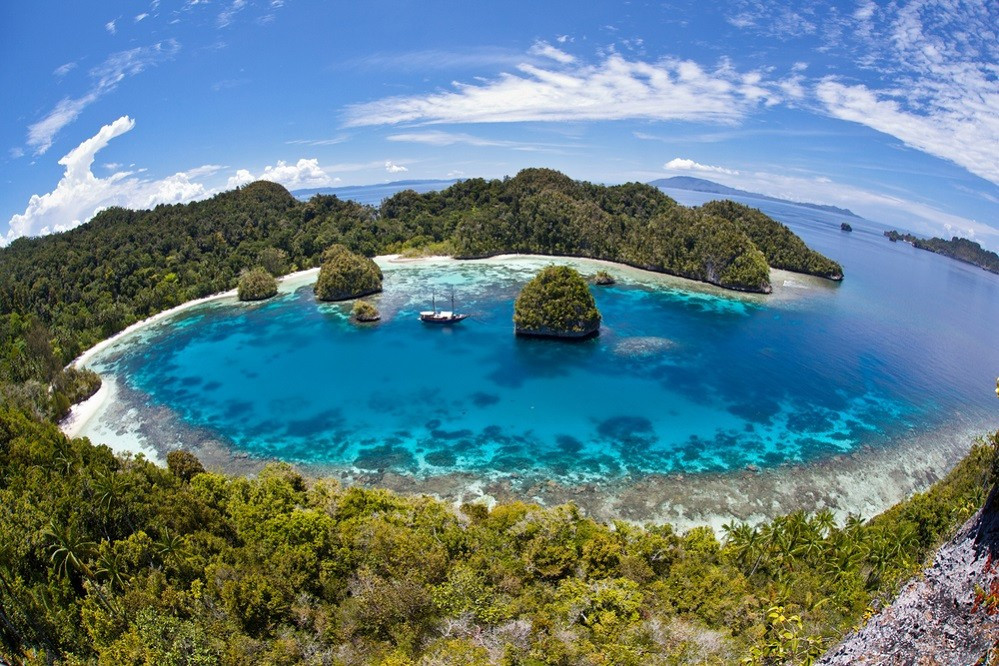News
Raja Ampat controversy, between nickel mining or sustainable tourism
Tenggara Strategics June 19, 2025 A remote lagoon, surrounded by limestone islands, protects a vibrant and diverse coral reef in Raja Ampat, West Papua. (Shutterstock/Ethan Daniels)
A remote lagoon, surrounded by limestone islands, protects a vibrant and diverse coral reef in Raja Ampat, West Papua. (Shutterstock/Ethan Daniels)
The Indonesian government is facing a critical dilemma as it seeks to advance its strategic nickel downstreaming agenda while managing mounting public pressure to preserve the ecological and tourism-rich region of Raja Ampat in Southwest Papua. The controversy over nickel mining in the area has spotlighted tensions between Indonesia’s ambition to lead in the global green supply chain through its nickel downstream industry development and the need to protect one of its most biodiverse and scenic marine ecosystems.
Public outcry intensified after Greenpeace protested nickel mining activities during the Indonesia Critical Minerals Conference & Expo at Hotel Pullman, Jakarta, on June 3, 2025. The organization’s viral campaign under the hashtag #SaveRajaAmpat featured footage of mining operations on Gag Island, raising concerns over environmental degradation. This triggered demands from the public and the House of Representatives for the government to halt all mining activity in Raja Ampat. Environmental experts also urged a revocation of nickel mining permits and a comprehensive review of mining concessions in the area.
While the Energy and Mineral Resources (ESDM) Ministry stated that its inspection of Gag Nickel’s (PT GN) site found no environmental damage as shown in the Greenpeace video, the Environment Ministry took a firmer stance. It suspended mining operations of PT GN and three other companies, namely Kawei Sejahtera Mining (PT KSM), Anugerah Surya Pratama (PT ASP), and Mulia Raymond Perkasa (PT MRP), for violating Law No. 1/2014, which prohibits mining on small islands due to their ecological vulnerability.
In the wake of widespread criticism, the government revoked the mining permits of PT KSM, PT ASP, PT MRP, and PT Nurham. However, PT GN’s permit remains intact, with ESDM Minister Bahlil Lahadalia arguing that its concession lies outside the boundaries of the UNESCO Global Geopark and will be placed under heightened monitoring. Meanwhile, President Prabowo Subianto is reportedly considering a complete cessation of nickel mining in Raja Ampat.
Nickel plays a vital role in Indonesia’s strategy to position itself as a global player in the electric vehicle (EV) supply chain. The country’s nickel production rose from 1.6 million tons in 2022 to 2.2 million tons in 2024, and further growth is anticipated under Presidential Regulation No. 55/2019, which promotes EV battery development. However, this industrial push has contributed to ecological costs, including the loss of 1,790 hectares of forest cover in West Papua, which includes what now is Southwest Papua, between 2001 and 2024.
According to the ESDM Ministry, Indonesia held 5.32 billion tons of nickel ore and 56.11 million tons of nickel metal reserves in 2024, making it a key global supplier. In comparison, the global nickel ore and nickel metal reserves were 18.55 billion tons and 184.6 million tons, respectively. Yet, the Institution of Engineers Indonesia (PII) warned in 2025 that the country’s saprolite nickel reserves—needed for smelters and comprising 60 percent of national supply—could be depleted within 9 to 13 years.
Meanwhile, Raja Ampat’s tourism industry remains a vital source of local income. In 2024, the region welcomed over 30,000 visitors, 70 percent of which were international, contributing Rp150 billion (US$9.25 million) to locally-generated revenue (PAD). Continued mining operations, particularly by PT GN, pose risks to this economic lifeline. Notably, the four companies whose permits were revoked had not been operational in 2025, underscoring the urgency to act before active damage occurs.
In response, the Tourism Ministry proposed a cross-ministry sustainable tourism master plan to follow up on the permit revocations. The government's next steps will signal whether it prioritizes long-term environmental and tourism sustainability or accelerates its downstreaming ambitions to power the global energy transition.
What we've heard
Several sources at the presidential office revealed that President Prabowo Subianto was reportedly upset after hearing Energy and Mineral Resources Minister Bahlil Lahadalia’s explanation regarding the mining controversy in Raja Ampat regency, Papua, which had spread on social media.

